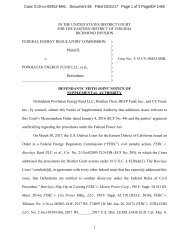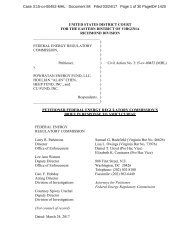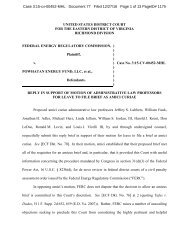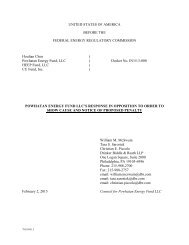FERC-v.-Barclays-180-1-Proposed-Brief
FERC-v.-Barclays-180-1-Proposed-Brief
FERC-v.-Barclays-180-1-Proposed-Brief
Create successful ePaper yourself
Turn your PDF publications into a flip-book with our unique Google optimized e-Paper software.
Case 2:13-cv-02093-TLN-DB Document <strong>180</strong>-1 Filed 11/07/16 Page 20 of 45<br />
1<br />
2<br />
3<br />
4<br />
5<br />
6<br />
7<br />
8<br />
9<br />
10<br />
11<br />
12<br />
13<br />
14<br />
15<br />
16<br />
17<br />
18<br />
19<br />
20<br />
21<br />
22<br />
23<br />
24<br />
25<br />
26<br />
27<br />
28<br />
investigative proceeding that did not produce the kind of administrative record that would be<br />
appropriate for judicial review, much less de novo review, since the defendants did not have the<br />
opportunity to participate as a party with the full panoply of discovery rights afforded defendants<br />
in APA proceedings or under the Federal Rules of Civil Procedure in court. The defendants<br />
participated only as targets of <strong>FERC</strong>’s investigation.<br />
Additionally, <strong>FERC</strong> cannot circumvent the defendants’ election of a court proceeding<br />
under section 31(d)(3) by providing the defendants with an opportunity to respond during the<br />
assessment investigation. <strong>FERC</strong> argues that its “Assessment Order was based on an extensive<br />
administrative process that provided [the defendants] with numerous procedural mechanisms to<br />
offer and support whatever defenses they could muster.” [ECF Dkt. No. 125] at 2. But whether<br />
<strong>FERC</strong> provided the defendants an opportunity to respond to the Agency’s allegations is irrelevant<br />
to the question of what procedures the Federal Power Act requires in an action brought in district<br />
court under section 31(d)(3). Congress adopted a statutory scheme that allows defendants to<br />
choose whether the full-scale, trial-type hearing takes place before an ALJ pursuant to<br />
section 31(d)(2) or before a district court judge pursuant to section 31(d)(3), and Congress clearly<br />
contemplated that defendants might reasonably choose either forum for that full-fledged hearing.<br />
It would be bizarre, to say the least, for Congress to have bestowed that choice on defendants only<br />
to have a defendant’s choice of a full-fledged hearing in district court under section 31(d)(3) be<br />
trumped by procedures <strong>FERC</strong> voluntarily provides to a defendant before issuing the Agency’s<br />
penalty assessment. The defendants in this case chose the district court option available under<br />
section 31(d)(3), not the option for a hearing before the Agency. Therefore, any hearing before<br />
<strong>FERC</strong> cannot suffice because that type of hearing is not what section 31(d)(3) guarantees.<br />
Section 31(d)(3) guarantees a full-scale hearing in court.<br />
At bottom, what <strong>FERC</strong> seems to be advocating here is an altogether different assessment<br />
regime than the two regimes clearly contemplated by section 31(d), where Congress gave subjects<br />
the choice between a full-scale, trial-type hearing before an ALJ or a de novo determination by a<br />
district court after a full-scale, trial-type hearing. <strong>FERC</strong> instead appears to seek this Court’s<br />
imprimatur on a regime where agencies (in this instance, <strong>FERC</strong>) can unilaterally define the scope<br />
15<br />
PROPOSED AMICI CURIAE BR. OF ADMIN. LAW PROFESSORS LUBBERS, FUNK ET AL.






